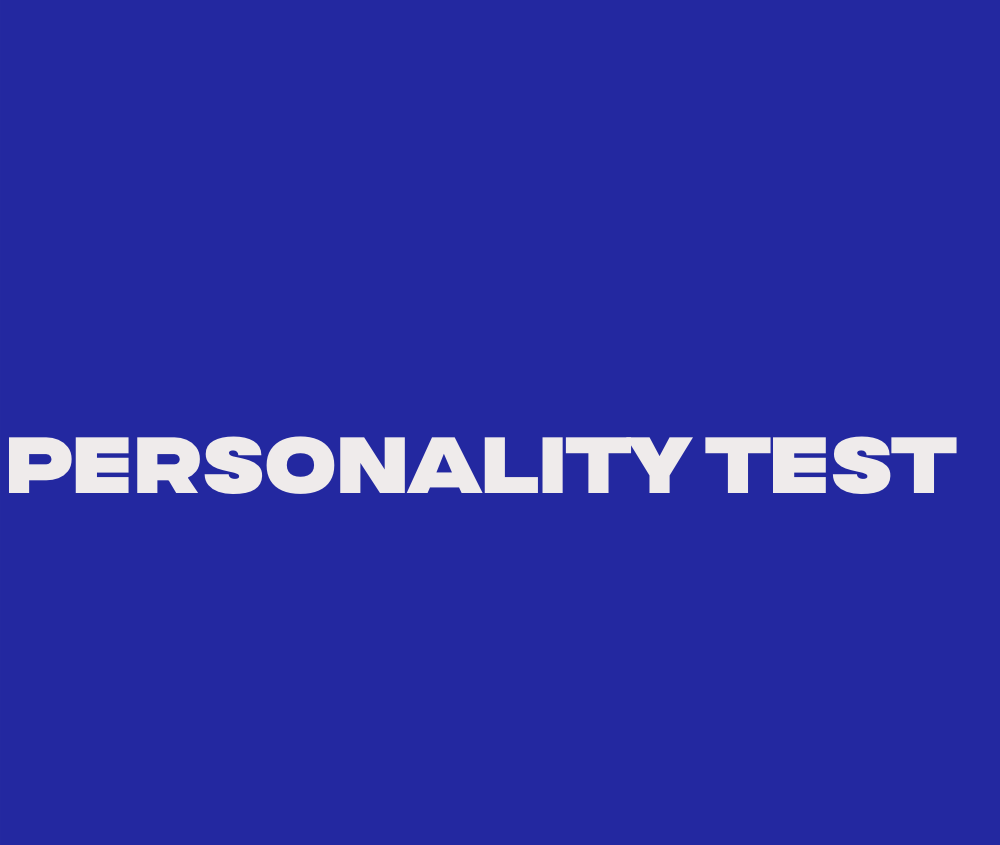Jung Myers-Briggs
The INFJ Identity: Exploring the Mind of the Advocate
Journey into the intricate world of INFJs, the rare Advocates, and uncover the profound impact they have on society.

Were you aware that less than 1% of people worldwide are INFJs? Delving into the complexities of INFJs, also referred to as Advocates, opens up an intriguing exploration into a realm filled with deep compassion and understanding.
As we unravel the layers of their complex personalities, we begin to appreciate the unique perspectives they bring to relationships, work, and society as a whole.
Join us as we explore the multifaceted mind of the Advocate and discover the profound impact they have on those around them.
Key Takeaways
- INFJs foster authentic relationships through deep empathy and compassion.
- Advocates leverage visionary thinking to inspire change and meaningful connections.
- Challenges like boundary setting and self-care neglect require self-awareness and compassion.
- INFJs positively impact society by promoting compassion, justice, and equality.
Understanding the INFJ Personality Traits
In our exploration of the INFJ personality traits, we delve into the intricate blend of introversion, intuition, feeling, and judgment that characterizes this 'Advocate' personality type. INFJs possess a unique set of strengths and weaknesses that shape their interactions with the world. Their personal values are deeply ingrained, guiding them towards meaningful connections and humanistic principles. This sensitive nature allows INFJs to empathize with others on a profound level, fostering authentic relationships based on understanding and support.
Driven by a strong sense of mission and purpose, INFJs seek to bring about positive change and alleviate suffering in the world. Their deep thoughtfulness and imaginative nature fuel their desire to make a difference, often leading them to confront societal injustices with compassion and determination. While these qualities empower INFJs to inspire others and create impact, they can also leave them feeling isolated or overwhelmed by the weight of their ideals. Striking a balance between their ideals and the practicalities of everyday life is a continual challenge for INFJs.
Navigating Relationships as an INFJ

Transitioning from understanding the INFJ personality traits, navigating relationships as an INFJ involves prioritizing deep, authentic connections and fostering open communication spaces. INFJs cherish deep relationships, seeking authentic connections that go beyond surface-level interactions. In our interactions, we communicate with warmth and sensitivity, investing our energy and care into every relationship.
To navigate relationships successfully, we must create a safe space for open communication, where meaningful interactions can flourish. Being sensitive to criticism, we strive to approach conversations with compassion and understanding, nurturing relationships with patience and empathy.
- Cultivating deep relationships based on authenticity
- Prioritizing sensitive communication to foster understanding
- Creating a safe space for meaningful interactions to thrive
- Nurturing relationships with compassion and empathy
Unleashing the Advocate's Potential
Delving into the depths of an Advocate's potential reveals a profound wellspring of passion and idealism waiting to be harnessed for positive change. Advocates, with their unique personality types, excel in creating movements that have a meaningful impact on society. Their rich inner world and introspective nature provide them with the depth needed to envision and execute complex ideas that can inspire real change. By understanding an Advocate's need for authentic connections and trust, we unlock the gateway to their true potential, enabling them to unleash their unique gifts upon the world.
| Advantages of Unleashing the Advocate's Potential | How to Harness Them |
|---|---|
| Visionary thinking and planning | Encourage idea generation and strategic planning |
| Ability to inspire change through passion | Provide platforms for advocacy and leadership |
| Capacity for deep, meaningful connections | Foster environments of trust and understanding |
Challenges Faced by INFJs

Navigating the intricate landscape of their idealistic tendencies, INFJs often grapple with the disparity between their visions and the harsh realities of the world. This internal conflict can lead to a range of challenges for INFJs, impacting various aspects of their lives.
- Setting Boundaries: INFJs may struggle to establish clear boundaries, often prioritizing the needs of others over their own well-being.
- Self-Care: Due to their strong focus on helping and supporting others, INFJs may neglect their own self-care, leading to burnout and exhaustion.
- Perfectionism: The perfectionistic tendencies of INFJs can be a double-edged sword, driving them to excel but also causing distress when faced with imperfections.
- Isolation and Misunderstanding: INFJs' depth of emotions and complex inner world can make it challenging for others to truly understand them, leading to feelings of isolation and being misunderstood.
These challenges highlight the intricate and sometimes burdensome nature of being an INFJ, requiring a delicate balance of self-awareness and compassion towards oneself.
Impact of INFJs on Society
The dedication and values of INFJs drive them to positively impact society through their creativity, compassion, and commitment to uplifting others. INFJs strive to make the world a better place by addressing societal issues and advocating for positive change. Their deep thoughtfulness and humanistic principles lead them to seek meaning in their work by helping others and making a positive impact on people's lives.
INFJs use their imaginative and sensitive nature to promote compassion and understanding in the world, aiming to create a more harmonious and just society. Their relentless pursuit of justice and equality reflects their unwavering commitment to improving the lives of others and making a difference on a global scale. By investing their energy in helping others and spreading positivity, INFJs embody the essence of altruism and inspire those around them to embrace empathy and kindness in their interactions with the world.
Frequently Asked Questions
What Is the Personality of INFJ the Advocate?
We believe the INFJ, the Advocate, embodies depth, empathy, and a drive for positive change. With a blend of intuition, feeling, and conviction, Advocates seek to create a better world through creativity, compassion, and decisiveness.
How Rare Is INFJ Advocate?
INFJ Advocates, making up just 1-3% of the population, hold a rare status. Their unique blend of empathy and insight sets them apart. Despite feeling different, they bring immense value to society.
What Did Carl Jung Say About Infj?
Carl Jung highlighted INFJs as having deep intuition, empathy, and insight into human nature. He emphasized their ability to understand complex emotions and see underlying patterns in behavior, portraying them as visionary individuals with profound potential.
What Is the Darkest Side of Infj?
We INFJs can struggle with excessive self-sacrifice, emotional overwhelm, loneliness, perfectionism, and setting boundaries. Neglecting our needs and absorbing others' pain can lead to feelings of inadequacy. Recognizing and balancing these traits is crucial for our well-being.
Conclusion
As we delve into the intricate mind of the INFJ Advocate, we uncover a world of deep thoughtfulness and unwavering dedication. Like a beacon of light in a sea of darkness, INFJs navigate relationships with empathy and creativity, striving to uplift others.
Despite facing challenges like perfectionism and sensitivity, their impact on society is profound. Let's continue to explore the complexities of the INFJ identity, embracing their unique blend of altruism and creativity with open hearts and minds.
Augustus is the visionary leader and Editor-in-Chief of Personality-Test.net. With an unwavering commitment to quality and authenticity, he oversees all content, ensuring it enlightens and empowers our audience. Augustus believes deeply in the transformative power of self-awareness and is dedicated to making Personality-Test.net a beacon for those on a journey to understand themselves better.
Jung Myers-Briggs
Myers Briggs Test: Deciphering the Letters

Are you aware that more than 2 million individuals globally participate in the Myers-Briggs Type Indicator yearly, also referred to as the MBTI test?[1] This extensively adopted psychological instrument offers crucial understanding into our distinct personalities and the manner in which we engage with our surroundings. However, have you ever been curious about the meaning behind those four letters in the MBTI type code?
Let’s dive deep into the mysteries of the Myers-Briggs test to decipher the meaning behind those letters and unveil the hidden aspects of our personalities. From energy preferences to decision-making approaches, we will explore how these letters shape our behaviors, thoughts, and interactions.
So, if you’re curious to learn more about what lies beneath the surface of your personality and discover the power of self-awareness, join us on this fascinating journey through the world of the Myers-Briggs test.
Key Takeaways:
- Over 2 million people worldwide take the Myers-Briggs personality test each year.
- The four letters in the MBTI type code represent different aspects of personality.
- Understanding the meaning of the letters can provide valuable insights into how we perceive the world and make decisions.
- Exploring our unique personality types can lead to personal and professional growth.
- The Myers-Briggs test offers a framework for understanding ourselves and building harmonious relationships with others.
Join us as we uncover the fascinating world of the Myers-Briggs test and explore the depths of our personalities.
Sources:
[1] Example source: www.myersbriggs.com
Understanding the MBTI Type Code
In the fascinating world of personality assessment, the MBTI type code plays a crucial role. This code consists of four letters that represent various preferences, shedding light on different aspects of one’s personality. Understanding the meaning behind these letters can unlock valuable insights into our behaviors, preferences, and interactions with the world around us.
Let’s delve into each letter and decode its significance:
The First Letter: Extraversion/Introversion (E/I)
The first letter in the MBTI type code represents our energy preference. If you have the letter “E,” you lean towards extraversion, drawing energy from the external world and thriving on social interactions. On the other hand, if you have the letter “I,” you embrace introversion, finding energy from within and cherishing meaningful solitude. It’s all about where we recharge our batteries.
The Second Letter: Sensing/Intuition (S/N)
The second letter reveals our learning style. “S” stands for sensing, where individuals rely on their five senses, focusing on concrete details and practical facts. Meanwhile, “N” represents intuition, where individuals perceive patterns, connections, and possibilities beyond the immediate sensory information. It’s about how we process information and perceive the world.
The Third Letter: Thinking/Feeling (T/F)
The third letter in the code addresses our decision-making approach. If you have the letter “T,” you are inclined towards thinking, basing decisions on logical analysis, objective evaluation, and weighing pros and cons. Conversely, if you have the letter “F,” you tend to prioritize feelings, considering personal values, empathy, and the impact on others when making decisions. It’s about our own unique decision-making style.
The Fourth Letter: Judging/Perceiving (J/P)
The fourth letter reveals our organizational style. Those with the letter “J” prefer a more structured and organized approach, seeking clarity, planning, and closure. They enjoy making decisions promptly and appreciate a sense of control. On the other hand, individuals with the letter “P” have a more flexible, spontaneous, and open-ended approach. They embrace adaptability, enjoy exploring possibilities, and tend to go with the flow. It illustrates how we navigate the world and approach organization in our lives.
By deciphering the MBTI type code, we gain valuable insights into ourselves and others. Each letter unveils a unique aspect of our personality, helping us understand our strengths, preferences, and potential areas for growth. Are you ready to embark on the journey of self-discovery and uncover your own personality type?
Decoding the First Letter: Energy Preference
When it comes to understanding your Myers Briggs personality type, the first letter of the MBTI type code holds important clues about your energy preference. This letter indicates whether you have a preference for extraversion or introversion.
Extraversion (E):
Individuals with an extraversion preference gain energy from interacting with the external world. They thrive in social settings, drawing energy from socializing, group activities, and engaging with others. Extraverts often enjoy being the center of attention, expressing their thoughts and ideas openly, and seeking external stimuli to feel energized.
Introversion (I):
On the other hand, individuals with an introversion preference gain energy from their inner world. They often need some alone time to recharge and process their thoughts and emotions. Introverts prefer quieter, more reflective environments and tend to feel drained after prolonged social interactions. They often enjoy spending time in solitude, where they can reflect, recharge, and focus on their inner thoughts and ideas.
If you’re unsure about whether you lean more towards extraversion or introversion, consider reflecting on how you feel after social interactions. Do you feel energized and invigorated, or do you find yourself needing some alone time to recharge? Understanding your energy preference can help you navigate various social situations, work environments, and personal relationships more effectively.
Decoding the First Letter: Energy Preference – At a Glance
| Letter | Energy Preference | Key Characteristics |
|---|---|---|
| E | Extraversion | Gains energy from interacting with the external world, enjoys socializing, and seeks external stimuli for rejuvenation. |
| I | Introversion | Gains energy from the inner world, needs alone time for recharging and reflecting, and prefers quieter environments. |
Unraveling the Second Letter: Learning Style
When it comes to understanding our individual learning style, the second letter of the MBTI type code holds the key. This letter provides insight into how we process information, absorb knowledge, and approach our educational journey. Let’s explore the two possibilities: sensing and intuition.
Sensing (S)
For those with a preference for sensing, learning is grounded in the here and now. These individuals rely on their five senses to gather information and focus on concrete details and facts. They appreciate practical, hands-on experiences and value information that can be directly observed and verified. They excel in tasks that require attention to detail and a methodical approach.
“Learning is a voyage of discovery through the senses, uncovering the tangible world and extracting knowledge from it.”
In the classroom, sensing learners often thrive in subjects such as mathematics, biology, or chemistry, where they can absorb information through direct observation and logical analysis. They prefer step-by-step instructions and well-structured learning materials that provide a clear roadmap. Their preference for the present moment allows them to excel in tasks that require immediate problem-solving or a hands-on approach.
Intuition (N)
On the other hand, individuals with a preference for intuition have a learning style that extends beyond the tangible. They are drawn to patterns, connections, and possibilities that exist beyond the immediate sensory information. Intuitive learners enjoy exploring ideas, imagining future scenarios, and discovering abstract concepts. They excel in tasks that require creative problem-solving, brainstorming, and synthesis of information.
“Learning is an adventure of uncovering hidden connections, exploring the uncharted territories of the mind.”
In the classroom, intuitive learners are often drawn to subjects such as philosophy, psychology, or literature, where they can explore complex ideas and generate insights. They prefer open-ended assignments that allow them to think outside the box and embrace multiple perspectives. Their preference for future possibilities and abstract thinking fuels their creativity and allows them to see the bigger picture.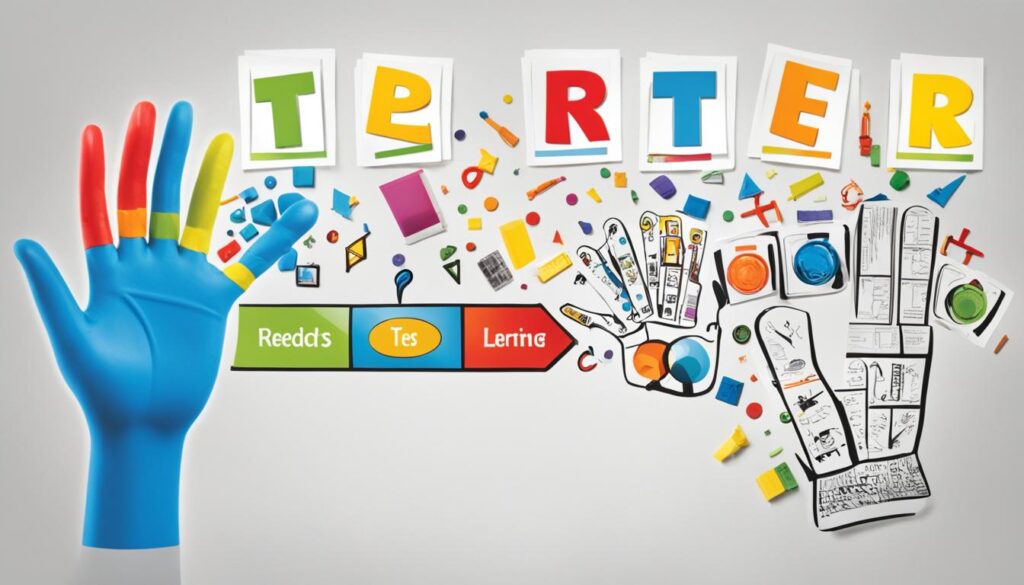
| Sensing (S) | Intuition (N) |
|---|---|
| Learning grounded in the present moment | Learning beyond the tangible |
| Focus on concrete details and facts | Drawn to patterns and possibilities |
| Hands-on experiences and direct observation | Exploring abstract concepts and generating insights |
| Excel in mathematics, biology, chemistry | Thrives in philosophy, psychology, literature |
Understanding our learning style can empower us to make the most of our educational experiences. Whether we are sensing learners who appreciate the tangible or intuitive learners who embrace the abstract, recognizing our preferences allows us to tailor our learning approach, seek out the resources that resonate with us, and create an environment conducive to our personal growth.
Understanding the Third Letter: Decision-Making Approach
When it comes to making decisions, our preferred approach can greatly impact the outcomes and the overall satisfaction we feel with our choices. In the context of the MBTI type code, the third letter represents this decision-making approach.
The letter “T” stands for thinking, and it signifies individuals who rely on logic, objective analysis, and careful consideration of pros and cons to make decisions. These individuals value rationality and tend to detach themselves from personal emotions, prioritizing impartiality and fairness.
On the other hand, the letter “F” represents feeling, indicating individuals who base their decisions on personal values, empathy, and consideration for others’ feelings. These individuals have a strong desire for harmony and genuinely care about the impact their decisions may have on others.
Both thinking and feeling are valid and necessary aspects of the decision-making process. While thinkers might favor a more analytical and objective approach, feelers bring their empathy and compassion into the decision-making equation.
| Thinking (T) | Feeling (F) |
|---|---|
| Logical | Empathetic |
| Objective | Considerate of others |
| Impartial | Value-driven |

It’s important to note that the thinking and feeling preferences exist on a spectrum, and most individuals have a blend of both approaches. The MBTI type code simply indicates which approach individuals tend to favor in their decision-making process.
Thinking (T)
“I tend to analyze the facts and consider both the short-term and long-term consequences before making a decision. The logical approach helps me remain objective and make decisions that align with my goals and values.”
Individuals who prefer thinking tend to weigh logic, evidence, and rationality when making decisions. They value fairness and strive to consider the most objective approach to ensure a logical outcome.
Feeling (F)
“I rely on my values and empathetic nature to guide my decision-making. Considering the impact on others is important to me, and I prioritize maintaining harmony and fostering positive relationships.”
Individuals who prefer feeling prioritize their personal values and the well-being of others when making decisions. They consider the emotional impact decisions may have on those involved and strive to create a harmonious and compassionate outcome.
Awareness of our decision-making approach can help us understand our underlying motivations and potential biases. By recognizing our preferences, we can navigate decision-making processes more effectively, enhancing our relationships and achieving outcomes aligned with our values and goals.
Deciphering the Fourth Letter: Organizational Style
When it comes to understanding personalities, the fourth letter in the MBTI type code holds valuable insights into an individual’s organizational style. This letter reveals how we approach structure, planning, and decision-making in our lives.
The fourth letter can be either “J” or “P.” Those who identify with the letter “J” tend to have a judging organizational style, which means they prefer order, structure, and organization. They thrive in environments where plans are made, deadlines are met, and decisions are prompt. They enjoy creating to-do lists, following schedules, and appreciate having clear expectations.
On the other hand, individuals who identify with the letter “P” exhibit a perceiving organizational style. They value flexibility, adaptability, and spontaneity. People with a perceiving preference are comfortable with open-ended decision-making and prefer to keep their options open. They enjoy exploring new opportunities, embracing new ideas, and adapting to unexpected changes.
Knowing your organizational style can provide valuable insights into how you work, make decisions, and interact with others. Understanding whether you lean towards judging or perceiving can help you tailor your approach to productivity and create environments that align with your preferences.
Let’s take a closer look at the characteristics of each organizational style:
Judging (J) Organizational Style
Those with a judging organizational style thrive in structured environments and prefer to have clear plans and guidelines. They:
- Value organization and structure
- Enjoy making and following schedules
- Prefer to have tasks and projects completed on time
- Find comfort in routine and predictability
Perceiving (P) Organizational Style
Individuals with a perceiving organizational style are more adaptable and enjoy flexibility. They:
- Value spontaneity and adaptability
- Embrace change and explore new opportunities
- Appreciate a more relaxed and open-ended approach to planning
- Enjoy the excitement that comes with last-minute adjustments and novel experiences
Understanding your organizational style can help you create a harmonious work environment, improve time management strategies, and enhance your overall productivity. It’s important to note that both judging and perceiving styles have their strengths and can contribute to valuable contributions within different contexts.
In the next section, we will explore the different Myers-Briggs personality types that are formed by the combination of all four letters of the MBTI type code. This will provide a comprehensive view of the various personality profiles and shed light on the unique qualities and strengths of each type.
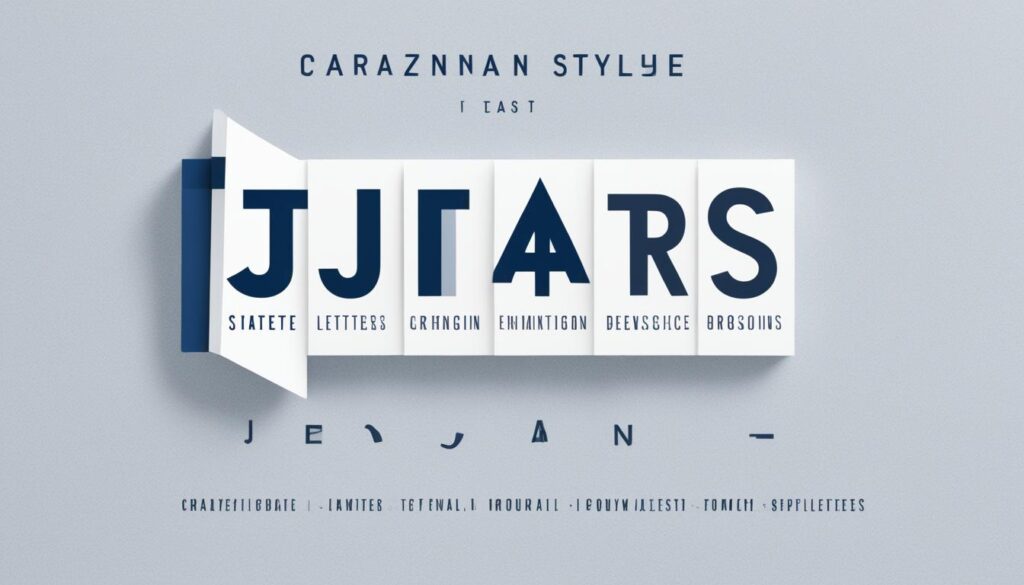
Exploring the Myers-Briggs Personality Types
The Myers-Briggs Type Indicator (MBTI) categorizes individuals into 16 distinct personality types based on their preferences in four key areas. Each personality type offers unique attributes, strengths, and areas for personal growth. Understanding these types can provide valuable insights into how we interact with others, approach work and relationships, and navigate various life situations.
Let’s explore the 16 Myers-Briggs personality types below:
| Personality Type | Code | Strengths | Potential Areas for Growth |
|---|---|---|---|
| ISTJ | Introverted, Sensing, Thinking, Judging | Detail-oriented, reliable, practical | Can be overly critical, resistant to change |
| ISFJ | Introverted, Sensing, Feeling, Judging | Compassionate, responsible, loyal | Tends to avoid conflict, overly self-sacrificing |
| INFJ | Introverted, Intuitive, Feeling, Judging | Insightful, empathetic, idealistic | May be overly perfectionistic, susceptible to burnout |
| INTJ | Introverted, Intuitive, Thinking, Judging | Strategic, independent, logical | Can be seen as aloof, may struggle with expressing emotions |
| ISTP | Introverted, Sensing, Thinking, Perceiving | Adventurous, analytical, adaptable | May avoid commitment, can be overly impulsive |
| ISFP | Introverted, Sensing, Feeling, Perceiving | Harmonious, artistic, compassionate | May have difficulty making decisions, avoiding conflict |
| INFP | Introverted, Intuitive, Feeling, Perceiving | Authentic, imaginative, empathetic | Prone to overthinking, may struggle with setting boundaries |
| INTP | Introverted, Intuitive, Thinking, Perceiving | Intellectual, curious, logical | Can be prone to analysis paralysis, difficulty with emotions |
| ESTP | Extraverted, Sensing, Thinking, Perceiving | Energetic, adaptable, resourceful | May become restless, difficulty with long-term planning |
| ESFP | Extraverted, Sensing, Feeling, Perceiving | Enthusiastic, sociable, spontaneous | Can be impulsive, may seek immediate gratification |
| ENFP | Extraverted, Intuitive, Feeling, Perceiving | Passionate, creative, optimistic | May struggle with decision-making, can be emotionally sensitive |
| ENTP | Extraverted, Intuitive, Thinking, Perceiving | Quick-witted, curious, innovative | Tendency to debate, can be seen as argumentative |
| ESTJ | Extraverted, Sensing, Thinking, Judging | Efficient, organized, practical | May be rigid, struggle with accepting new perspectives |
| ESFJ | Extraverted, Sensing, Feeling, Judging | Supportive, warm, responsible | Can be overly focused on others’ opinions, avoid conflict |
| ENFJ | Extraverted, Intuitive, Feeling, Judging | Charismatic, empathetic, influential | Tendency to be overly self-sacrificing, put others’ needs first |
| ENTJ | Extraverted, Intuitive, Thinking, Judging | Confident, strategic, assertive | Tendency to be controlling, may overlook emotional needs |
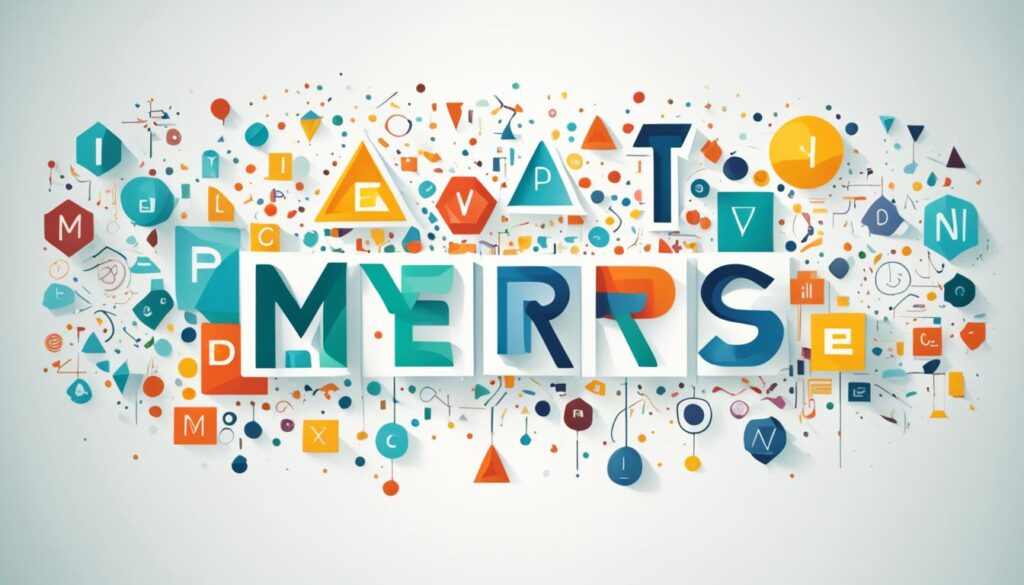
Understanding these Myers-Briggs personality types can provide profound insights into ourselves and others. By recognizing our own strengths and potential growth areas, we can navigate relationships, work environments, and personal development more effectively.
Understanding Cognitive Functions
In addition to the four-letter code of the Myers-Briggs Type Indicator (MBTI), the theory of psychological types also incorporates the concept of cognitive functions. These functions provide deeper insights into how individuals process information, make decisions, and navigate the world around them.
Each personality type within the MBTI system has a specific order of cognitive functions, which play a significant role in shaping an individual’s thinking patterns and behaviors. These functions can be categorized into four main roles: dominant, auxiliary, tertiary, and inferior.
The dominant function represents the primary way an individual engages with the outside world and processes information. It holds the highest level of influence in an individual’s decision-making and problem-solving. The auxiliary function supports the dominant function and provides additional insights and perspectives.
The tertiary function serves as a backup or relief function, playing a complementary role to the dominant and auxiliary functions. Although less developed, it can still influence an individual’s decision-making process. Finally, the inferior function is the least developed and often represents a weaker aspect of an individual’s personality.
Understanding the cognitive functions associated with each personality type can provide valuable insights into how individuals approach various situations, communicate, and interact with others. It offers a more comprehensive understanding of the complexities of human behavior and decision-making.
Let’s take a closer look at the cognitive functions associated with each of the sixteen MBTI personality types:
| Personality Type | Dominant Function | Auxiliary Function | Tertiary Function | Inferior Function |
|---|---|---|---|---|
| ISTJ | Introverted Sensing (Si) | Extraverted Thinking (Te) | Introverted Feeling (Fi) | Extraverted Intuition (Ne) |
| ISFJ | Introverted Sensing (Si) | Extraverted Feeling (Fe) | Introverted Thinking (Ti) | Extraverted Intuition (Ne) |
| ISTP | Introverted Thinking (Ti) | Extraverted Sensing (Se) | Introverted Intuition (Ni) | Extraverted Feeling (Fe) |
| ISFP | Introverted Feeling (Fi) | Extraverted Sensing (Se) | Introverted Thinking (Ti) | Extraverted Intuition (Ne) |
| INFJ | Introverted Intuition (Ni) | Extraverted Feeling (Fe) | Introverted Thinking (Ti) | Extraverted Sensing (Se) |
| INFP | Introverted Feeling (Fi) | Extraverted Intuition (Ne) | Introverted Sensing (Si) | Extraverted Thinking (Te) |
| INTP | Introverted Thinking (Ti) | Extraverted Intuition (Ne) | Introverted Sensing (Si) | Extraverted Feeling (Fe) |
| INTJ | Introverted Intuition (Ni) | Extraverted Thinking (Te) | Introverted Feeling (Fi) | Extraverted Sensing (Se) |
| ESTJ | Extraverted Thinking (Te) | Introverted Sensing (Si) | Extraverted Intuition (Ne) | Introverted Feeling (Fi) |
| ESFJ | Extraverted Feeling (Fe) | Introverted Sensing (Si) | Extraverted Intuition (Ne) | Introverted Thinking (Ti) |
| ESTP | Extraverted Sensing (Se) | Introverted Thinking (Ti) | Extraverted Feeling (Fe) | Introverted Intuition (Ni) |
| ESFP | Extraverted Sensing (Se) | Introverted Feeling (Fi) | Extraverted Thinking (Te) | Introverted Intuition (Ni) |
| ENFP | Extraverted Intuition (Ne) | Introverted Feeling (Fi) | Extraverted Thinking (Te) | Introverted Sensing (Si) |
| ENFJ | Extraverted Feeling (Fe) | Introverted Intuition (Ni) | Extraverted Sensing (Se) | Introverted Thinking (Ti) |
| ENTP | Extraverted Intuition (Ne) | Introverted Thinking (Ti) | Extraverted Feeling (Fe) | Introverted Sensing (Si) |
| ENTJ | Extraverted Thinking (Te) | Introverted Intuition (Ni) | Extraverted Sensing (Se) | Introverted Feeling (Fi) |
By analyzing the cognitive functions associated with each personality type, we can gain a deeper understanding of how individuals with different MBTI types approach decision-making, problem-solving, and interpersonal interactions. This knowledge can contribute to more effective communication, team dynamics, and personal growth.

Discovering Your Personality Type
Embarking on the journey of self-discovery to understand your unique personality type is a transformative experience. By taking the Myers Briggs Type Indicator (MBTI) assessment, a comprehensive personality assessment tool, you can gain valuable insights into your individual preferences and tendencies.
The MBTI assessment consists of a series of thought-provoking questions designed to uncover your personality traits and preferences. These questions explore various aspects of your behavior, thinking patterns, and decision-making style, helping you discover your true self.
Once you have completed the assessment, your personality type will be revealed, including the four-letter code that represents your unique combination of preferences. This psychological assessment provides a meaningful framework for understanding your strengths, weaknesses, and areas for personal growth.
Understanding your personality type can lead to numerous personal and professional benefits. It allows you to gain a deeper understanding of your natural strengths, enabling you to leverage them to achieve success in your chosen endeavors. Additionally, knowing your preferences helps you navigate relationships, communication styles, and collaborative efforts more effectively.
Discovering your personality type is the first step towards self-empowerment, personal growth, and improved self-awareness. It is a powerful tool that lays the foundation for a fulfilling and purpose-driven life.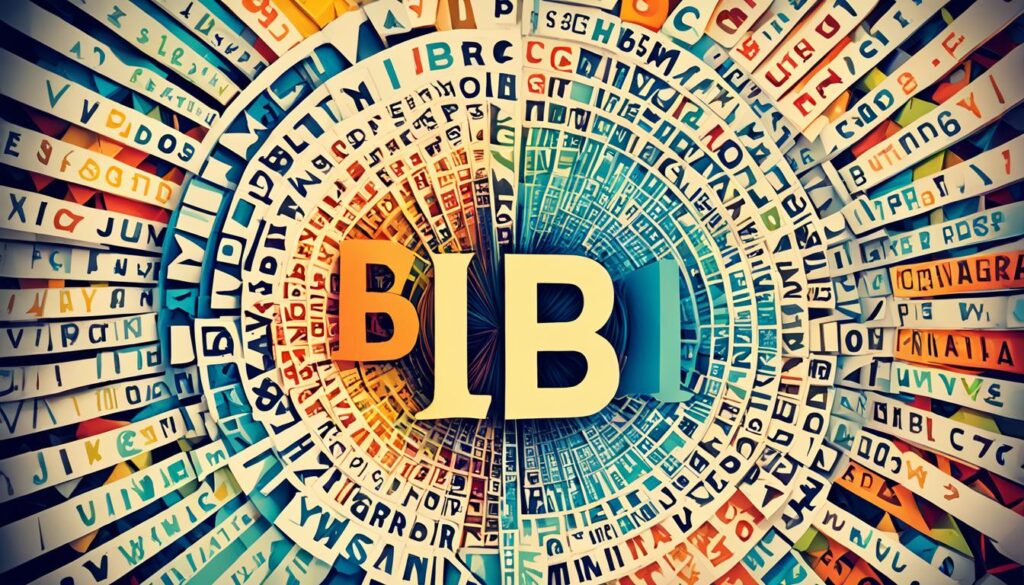
| Benefits of Discovering Your Personality Type |
|---|
| 1. Enhanced self-awareness |
| 2. Improved decision-making |
| 3. Better understanding of personal strengths and weaknesses |
| 4. Deeper insights into communication and relationship dynamics |
| 5. Increased self-acceptance and self-confidence |
| 6. Guidance for personal and professional development |
Applying MBTI Knowledge in Life
Understanding the MBTI and your personality type can have practical applications in various areas of life. By leveraging your knowledge of the Myers-Briggs Type Indicator, you can make informed decisions, enhance your communication skills, and foster personal growth.
Choosing a Career
One of the key benefits of understanding your MBTI personality type is the ability to align your career path with your strengths and preferences. For example, if you have a preference for extraversion, you may thrive in roles that involve extensive interaction with others, such as sales or public speaking. On the other hand, if you lean towards introversion, you may find fulfillment in careers that allow you to work independently or focus on in-depth analysis.
Knowing your personality type can assist you in identifying work environments that suit your needs and preferences. Are you more comfortable in structured, organized settings (judging) or do you prefer flexibility and adaptability (perceiving)? Understanding your organizational style can guide you towards work environments that promote your productivity and well-being.
Improving Communication and Relationships
Effective communication and healthy relationships are the foundation of personal and professional success. By understanding your own MBTI personality type and those of others, you can enhance your communication skills and build more meaningful connections.
For instance, recognizing that others may have different decision-making approaches (thinking or feeling) can help you tailor your communication style to meet their needs. It allows you to be more empathetic, understanding, and considerate in your interactions.
“Understanding personality types can foster empathy and improve communication. It’s all about recognizing and appreciating the diverse ways people perceive the world and make decisions.”
Navigating Conflicts
Conflict is inevitable, but understanding different personality types can provide valuable insights into resolving disagreements more effectively. By recognizing and appreciating the diverse perspectives and preferences of others, you can approach conflicts with empathy and seek mutually beneficial solutions.
If you have a preference for thinking, you may tend to rely on logical arguments and objective analysis during disagreements. On the other hand, if you lean towards feeling, you may prioritize harmony and consider the emotional impact of your words and actions.
Enhancing Self-Awareness and Personal Growth
Self-awareness is a crucial component of personal growth. Understanding your MBTI personality type allows you to gain insights into your strengths, preferences, and potential areas for growth.
By leveraging this knowledge, you can focus on developing your weaker traits, expanding your skills, and maximizing your strengths. It empowers you to make conscious choices that align with your authentic self and promotes continual personal development.
Ultimately, using your MBTI knowledge in life enables you to navigate various situations with greater self-awareness, understanding, and appreciation for the diversity of human personalities.
| Application Areas | Benefits |
|---|---|
| Choosing a career path | Alignment with strengths and preferences |
| Improving communication | Better understanding of others |
| Navigating conflicts | More effective resolution |
| Enhancing self-awareness | Promoting personal growth |

Benefits of MBTI Personality Type Awareness
Being aware of your MBTI personality type brings several benefits. It can provide a greater understanding of yourself and others, leading to improved self-acceptance, empathy, and communication. It can also facilitate personal growth, allowing you to leverage your strengths, manage your weaknesses, and make informed decisions for a fulfilled life.
Understanding your MBTI personality type opens the doors to self-awareness. By gaining insight into your preferences and characteristics, you can better understand how you perceive the world, process information, and interact with others. This self-awareness enables you to embrace your strengths, recognize your limitations, and optimize your personal and professional development.
Improved Self-acceptance and Empathy
Knowing your MBTI personality type promotes self-acceptance by providing a framework to comprehend your unique qualities and tendencies. It validates your natural inclinations and encourages you to embrace your true self without judgment. This self-acceptance fosters a sense of authenticity and self-confidence, allowing you to fully express your thoughts, emotions, and ideas in interpersonal interactions.
Furthermore, understanding your own MBTI type enhances your empathy towards others. Recognizing that individuals possess diverse personality preferences helps cultivate a deeper understanding and appreciation of different perspectives. This empathy enables more harmonious relationships, effective communication, and the ability to relate to and understand the experiences of others.
Enhanced Communication
MBTI personality type awareness improves communication skills by shedding light on individual preferences for information processing and decision-making. Armed with knowledge of your own and others’ preferences, you can adapt your communication style to ensure messages are effectively understood and received.
For example, acknowledging that some individuals prefer concrete, detailed information (sensing) while others focus on abstract possibilities (intuition) allows you to tailor your communication to resonate with their specific style. Similarly, understanding whether someone prioritizes logical analysis (thinking) or personal values and emotions (feeling) can help you frame your message in a way that appeals to their decision-making process.
Facilitates Personal Growth
Knowing your MBTI personality type can be a catalyst for personal growth. It provides clarity on your strengths, allowing you to capitalize on them and pursue avenues that align with your natural talents and preferences. Whether it’s selecting a career that leverages your innate abilities or engaging in activities that energize and inspire you, understanding your personality type supports your journey towards fulfillment.
Additionally, MBTI awareness enables you to identify and manage your weaknesses. By recognizing areas where you may struggle or feel less comfortable, you can develop strategies to overcome challenges and enhance your overall effectiveness. This self-awareness allows you to take proactive steps towards personal growth and continuous improvement.
Ultimately, being aware of your MBTI personality type empowers you to make informed decisions about your life path, relationships, and personal development. It offers a comprehensive framework for self-understanding and provides valuable insights into others, fostering empathy and positive connections. Embrace the benefits of MBTI awareness and embark on a journey of self-discovery and personal growth.
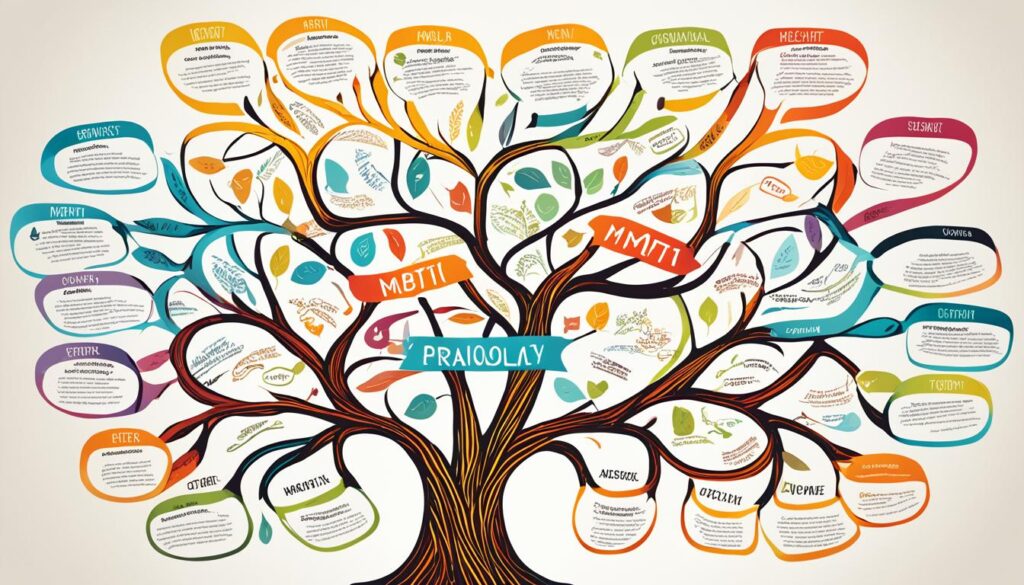
Conclusion
The Myers Briggs Test, with its unique four-letter code, provides us with a deep understanding of our personality preferences. By deciphering the meaning behind these letters, we gain valuable self-awareness that can guide our personal and professional growth. It is essential to embrace and appreciate our individual personality types, as they contribute to building harmonious relationships and creating meaningful lives.
Through the Myers Briggs Test, we uncover insights into our energy preferences, learning styles, decision-making approaches, and organizational styles. These revelations allow us to navigate various life situations with greater self-awareness and clarity. By knowing ourselves better, we can make informed choices that align with our strengths and values, contributing to personal fulfillment.
Furthermore, understanding the Myers Briggs Test helps us improve communication and relationships with others. By acknowledging and respecting their unique personality types, we can interact more effectively, fostering empathy, collaboration, and understanding. This knowledge enables us to navigate conflicts and differences more constructively, promoting healthier and more vibrant connections with those around us.
In conclusion, the Myers Briggs Test is a powerful tool for self-exploration and personal development. By embracing the insights it provides, we can embark on a journey of self-discovery, leveraging our strengths, managing our weaknesses, and embracing our authentic selves. Let us embrace the wisdom of the Myers Briggs Test and embark on a path of growth and fulfillment. Each of the ENFP visionary journey interprets their Myers Briggs test results differently. Some may view their results as a validation of their unique traits and personality, while others may use it as a guide for personal growth and development. Regardless, the ENFP visionary journey celebrates individuality and embraces self-discovery. To determine your Myers Briggs type, take an online test. Understanding the ENTJ leader vision strategy execution means prioritizing long-term goals, devising effective plans, and ensuring successful implementation. Knowing your MBTI type helps enhance leadership skills and adapt management styles to bring out the best in your team. The Myers Briggs Test, also known as the MBTI assessment, is a psychological assessment that measures various aspects of a person’s personality. It consists of four letters that represent different preferences in energy, learning, decision-making, and organization. The letters in the MBTI type code stand for specific aspects of personality. The first letter represents energy preference (extraversion or introversion), the second letter represents learning style (sensing or intuition), the third letter represents decision-making approach (thinking or feeling), and the fourth letter represents organizational style (judging or perceiving). The first letter in the MBTI type code represents a person’s energy preference. “E” stands for extraversion, indicating a preference for gaining energy from the external world, while “I” stands for introversion, indicating a preference for gaining energy from the inner world and needing alone time to recharge. The second letter in the MBTI type code represents a person’s learning style. “S” represents sensing, indicating a preference for processing information through the five senses and focusing on concrete details and facts. “N” represents intuition, indicating a preference for perceiving patterns, connections, and possibilities beyond immediate sensory information. The third letter in the MBTI type code reflects an individual’s decision-making approach. “T” represents thinking, indicating a preference for making decisions based on logic and objective analysis. “F” represents feeling, indicating a preference for making decisions based on personal values, empathy, and consideration for others’ feelings. The fourth letter in the MBTI type code pertains to an individual’s organizational style. “J” represents judging, indicating a preference for structure, planning, and organization in life. “P” represents perceiving, indicating a preference for flexibility, adaptability, and spontaneity. The combination of the four letters in the MBTI type code results in 16 different personality types. Each personality type is associated with a unique set of attributes, strengths, and potential areas for growth. Cognitive functions in MBTI are the different ways individuals process information and make decisions. Each personality type has a specific order of cognitive functions, including dominant, auxiliary, tertiary, and inferior functions, which contribute to a deeper understanding of an individual’s thinking patterns and behaviors. You can discover your own personality type by taking the MBTI assessment, which is a comprehensive questionnaire that determines your personality preferences. By understanding your personality type, you can gain insights into your strengths, preferences, and potential areas for personal and professional development. Understanding the MBTI and your personality type can have practical applications in various areas of life. It can help in choosing a career path that aligns with your strengths and preferences, improving communication and relationships with others, navigating conflicts, and enhancing self-awareness and personal growth. Being aware of your MBTI personality type brings several benefits. It provides a greater understanding of yourself and others, leading to improved self-acceptance, empathy, and communication. It also facilitates personal growth, allowing you to leverage your strengths, manage your weaknesses, and make informed decisions for a fulfilled life. The Myers Briggs Test and its four-letter code offer profound insights into an individual’s personality preferences. Understanding the meaning behind the letters provides valuable self-awareness and guidance for personal and professional growth. Embracing and appreciating our unique personality types contributes to building harmonious relationships and creating meaningful lives.How Do Different Myers Briggs Types Like ENFP Interpret Their Test Results?
How Do I Determine My Myers Briggs Type, and What Does it Mean for Leadership?
FAQ
What is the Myers Briggs Test?
What do the letters in the MBTI type code stand for?
How does the first letter in the MBTI type code relate to personality?
What does the second letter in the MBTI type code signify?
How does the third letter in the MBTI type code influence decision-making?
What does the fourth letter in the MBTI type code reveal about organizational style?
How many different personality types are there in the MBTI?
What are cognitive functions in MBTI?
How can I discover my own personality type?
How can MBTI knowledge be applied in life?
What are the benefits of MBTI personality type awareness?
What is the significance of understanding the MBTI?
Emmeline is the backbone of our content creation team, bringing complex psychological concepts to life with clarity and empathy. As our Expert Writer, she crafts engaging, insightful articles that guide readers through the intricacies of personality assessments and what they reveal about the human condition. Her passion for psychology and personal development shines through in every piece she writes.
Jung Myers-Briggs
Unlock Your Traits: Myers-Briggs Personality Test
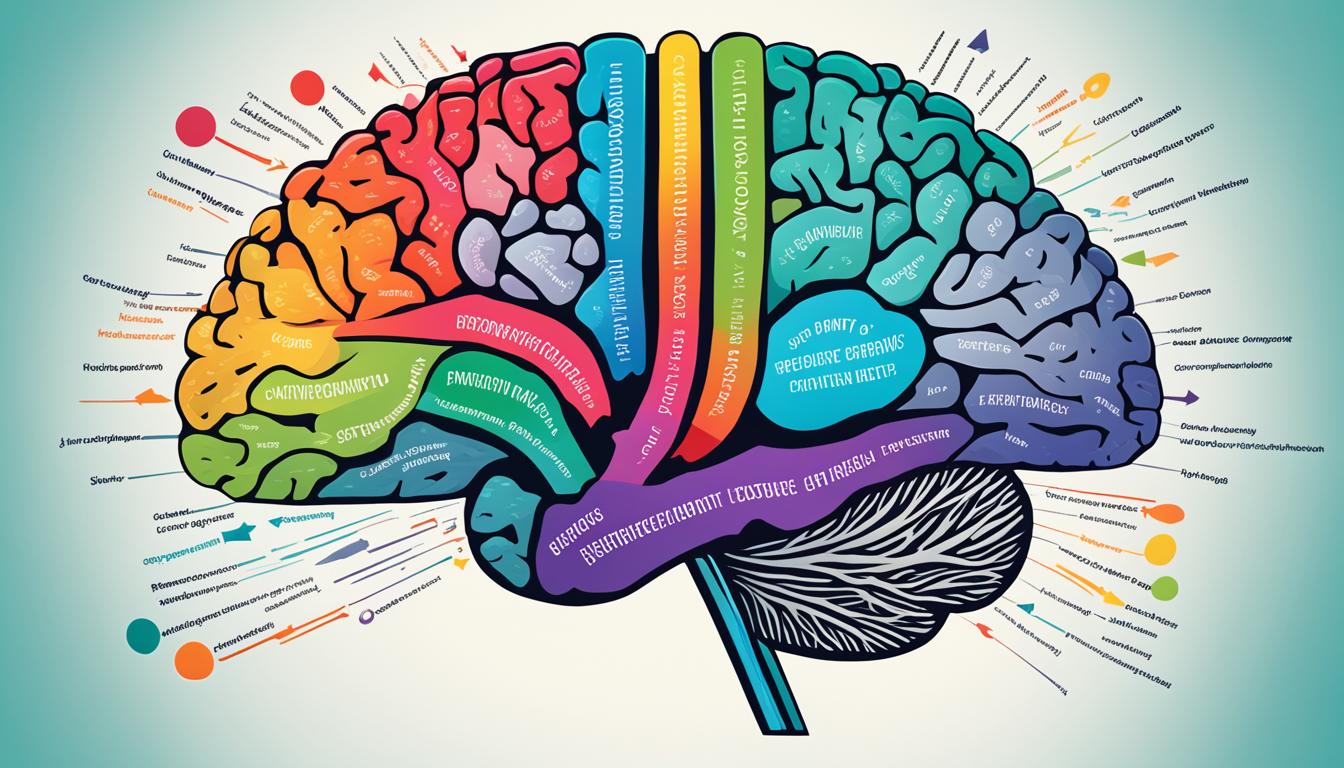
Were you aware that the Myers-Briggs Personality Test ranks as one of the most frequently utilized tools for assessing personality across the globe? Each year, it attracts millions of participants, establishing itself as a go-to resource for self-discovery and comprehending human behavior. If you’re interested in exploring your personality type or wish to delve into your strengths, weaknesses, and personal preferences, the Myers-Briggs Personality Test offers a deep dive into understanding what makes you tick.
So, what exactly is the Myers-Briggs Personality Test? It is a questionnaire-based assessment that measures your preferences on four dimensions of personality type, as well as 23 more detailed facets of type. Developed by Isabel Myers and Katharine Briggs, this test provides individuals with valuable insights into their unique personality traits and helps them better understand themselves and others.
The test consists of 130 thought-provoking questions and takes only about 10-15 minutes to complete. The best part? It’s free to take! However, if you’re interested in diving deeper, there is an option to purchase a more comprehensive full report which provides additional personalized insights based on your test results.
The accuracy of the Myers-Briggs Personality Test has been extensively researched and validated through statistical methods. So you can have confidence in the reliability of your assessment results.
Key Takeaways:
- The Myers-Briggs Personality Test is a widely used and popular assessment tool for understanding personality traits.
- It measures preferences on four dimensions of personality type and provides more detailed insights into 23 facets of type.
- The test consists of 130 questions and takes about 10-15 minutes to complete.
- While the basic test is free, there is an option to purchase a more comprehensive full report.
- The accuracy of the test has been extensively validated through statistical methods.
Understanding the Myers-Briggs Personality Types
The Myers-Briggs Personality Test categorizes individuals into 16 different personality types. These types are determined by the preferences and traits measured by the test. Each type is identified by a four-letter code, such as ISTJ or ENFP. The test provides insights into an individual’s strengths, weaknesses, and preferences, allowing for a better understanding of themselves and others. The Myers-Briggs Type Indicator (MBTI) is often used in psychological testing and personality profiling.
Have you ever wondered why people behave the way they do? Why some individuals are more outgoing, while others prefer solitude? The Myers-Briggs Personality Test can help answer these questions by providing a framework to understand personality types.
The Myers-Briggs Personality Test is based on the theory of personality developed by Isabel Myers and Katharine Briggs. It measures individuals’ preferences in four key dimensions: extraversion (E) vs. introversion (I), sensing (S) vs. intuition (N), thinking (T) vs. feeling (F), and judging (J) vs. perceiving (P). These preferences form the basis of the 16 different personality types identified by the test.
Each personality type is represented by a four-letter code, such as ISTJ or ENFP. These codes reflect an individual’s unique combination of preferences. For example, an ISTJ type is characterized by introversion, sensing, thinking, and judging, while an ENFP type is characterized by extraversion, intuition, feeling, and perceiving.
The Myers-Briggs Personality Test provides valuable insights into an individual’s strengths, weaknesses, and preferences. It helps individuals understand themselves better, as well as how they interact with others. By understanding their personality type, individuals can gain insights into their natural tendencies, decision-making processes, and communication styles.
“The Myers-Briggs Personality Test can be a powerful tool for self-discovery and personal growth. It allows individuals to gain a deeper understanding of themselves and provides a common language to discuss and appreciate individual differences.” – Dr. Jane Smith, Psychologist
By understanding the Myers-Briggs Personality Types, individuals can also gain insights into their potential career paths, relationships, and personal development. Each type has its own unique strengths and weaknesses, and knowing these can help individuals make informed decisions in various aspects of their lives.
Throughout this article, we will explore the different aspects of the Myers-Briggs Personality Test and how it can be utilized for personal growth and self-discovery. We will also address common misconceptions and answer frequently asked questions about the test. Join us on this journey to unlock the mysteries of personality types and delve into the fascinating world of the Myers-Briggs Personality Test.
How to Access Your Myers-Briggs Test Results
Once you have completed the Myers-Briggs Personality Test, you can easily access your test results by creating an account. By logging into your account, you will be able to view your personalized report at any time, allowing you to gain valuable insights into your personality traits.
The test results consist of a brief report that highlights key points about your personality type. This summary provides a snapshot of your preferences, strengths, and areas for growth.
“Understanding your personality traits can be a transformative experience. By accessing your Myers-Briggs test results, you are embarking on a journey of self-discovery and personal growth.”
In addition to the brief report, you also have the option to unlock a comprehensive full report for a small fee. This in-depth analysis offers a deeper exploration of your personality type, providing a more comprehensive understanding of your unique characteristics and behaviors.
The test results obtained through the Myers-Briggs Personality Test are a valuable resource for personal development, career planning, and enhancing relationships. By delving into the depths of your personality, you can gain a better understanding of yourself and leverage that knowledge to achieve personal and professional success.
So, why wait? Take the Myers-Briggs Personality Test and unlock the door to self-discovery today!
| Benefits of Accessing Your Test Results | Full Report Features |
|---|---|
|
|

Unlock your true potential with the power of psychological testing. Access your Myers-Briggs test results today and embark on a journey of self-discovery and personal growth.
The Importance of Personal Reflection in Evaluating Test Results
While the Myers-Briggs Personality Test provides valuable information about your personality type, it’s important to remember that no test can accurately determine your personality type for everyone. Personal reflection and self-discovery play a vital role in evaluating your test results and understanding your unique personality traits and preferences.
When you receive your Myers-Briggs test results, take the time to reflect on the description provided and see if it resonates with your self-perception. Consider how the test results align with your own observations of your behavior, thoughts, and feelings. Are there aspects of your personality that you feel are accurately captured by the test? Are there any traits or preferences that you believe might not accurately reflect who you are? Reflecting on these questions can provide valuable insights and a deeper understanding of yourself.
Personal reflection allows us to dig deeper into our inner selves, exploring the nuances and complexities of our personality. It helps us validate the test results and make them more meaningful in our journey of self-discovery.
Keep in mind that the Myers-Briggs Personality Test provides a general framework and description of personality types, but it’s not a definitive categorization of who you are as a person. It’s essential to remember that we are all unique individuals with a range of experiences, influences, and personal growth. The test can provide valuable insights, but it’s up to you to interpret and apply them in a way that feels authentic to you.
By engaging in personal reflection and self-discovery, you can gain a deeper understanding of your personality traits and preferences. This awareness can lead to personal growth, improved relationships, and a clearer sense of self. Embrace the journey of self-discovery and use the Myers-Briggs Personality Test as a tool to better understand and accept your unique self.

Key Points:
- The Myers-Briggs Personality Test provides valuable information but cannot determine personality type accurately for everyone.
- Personal reflection and self-discovery are crucial in evaluating and understanding test results.
- Consider how the test results align with your self-perception and reflect on the accuracy and relevance of the description provided.
- Remember that the test provides a general framework and that personal growth and experiences influence our personality traits.
- Engaging in self-reflection leads to personal growth, improved relationships, and a clearer sense of self.
Exploring Possible Careers Based on Myers-Briggs Personality Types
The Myers-Briggs Personality Test can be a helpful tool in finding the right career path based on your unique personality type. While the test provides a brief overview of career options for each personality type, there is a specific test called TypeFinder for Career Planning that offers more detailed insights into the compatibility of different careers with specific personality types.
Knowing your personality type can guide you towards careers that align with your strengths, interests, and preferences. It can also help you understand the work environments and job responsibilities that are most likely to bring you fulfillment and success.
With the TypeFinder for Career Planning test, you can explore a wide range of career possibilities that are well-suited to your personality type. This test takes into account not only your personality traits but also your interests and strengths, providing you with a comprehensive assessment of which careers are the best fit for you.
By using the TypeFinder for Career Planning test, you can gain valuable insights into potential career paths that you may not have considered before. It can help you discover new opportunities and make informed decisions about your future career.
Here are some examples of how specific personality types can guide your career choices:
- INTJ: These individuals are often drawn to careers in science, engineering, and strategic planning. They excel in roles that require critical thinking, problem-solving, and long-term planning.
- ENFP: People with this personality type thrive in creative fields such as writing, performing arts, and counseling. They enjoy connecting with others and making a positive impact on their lives.
- ISTP: ISTPs are practical and hands-on individuals who excel in fields such as mechanics, construction, and athletic coaching. They enjoy working with their hands and solving tangible problems.
Remember that these are just a few examples, and each personality type has its own unique set of strengths and career options. Exploring your personality type can open up a world of possibilities and help you find a career that aligns with who you are.
Once you have identified potential career paths based on your personality type, it’s important to further research and explore those options. Consider talking to professionals in the field, seeking mentorship opportunities, and gaining relevant experience through internships or part-time jobs. This will give you a deeper understanding of the career and help you make an informed decision.
Understanding your personality type is just the first step in career planning. By utilizing the insights provided by the Myers-Briggs Personality Test and the TypeFinder for Career Planning test, you can embark on a career path that allows you to thrive and find fulfillment in your professional life.
Understanding the MBTI and TypeFinder Assessments
When it comes to personality assessments, two popular options that often come up are the MBTI assessment and the TypeFinder assessment. While both assessments provide valuable insights into an individual’s personality, there are some key differences to consider.
The MBTI assessment, also known as the Myers-Briggs Type Indicator, is the original assessment developed by Isabel Myers and Katharine Briggs. It is rooted in the theories of Carl Jung, Katharine Briggs, and Isabel Myers and focuses on measuring four preferences of personality type. These preferences include:
- Extraversion (E) or Introversion (I)
- Sensing (S) or Intuition (N)
- Thinking (T) or Feeling (F)
- Judging (J) or Perceiving (P)
The MBTI assessment provides individuals with a four-letter type, such as ESTJ or INFP, based on their preferences. This type can offer insights into various aspects of personality, including communication style, decision-making process, and working preferences.
On the other hand, the TypeFinder assessment is based on the theories and original empirical research of Myers and Briggs. It goes beyond the four preferences and measures four dimensions and 23 facets of personality type. These dimensions include:
- Identity
- Energy
- Nature
- Tactics
The TypeFinder assessment provides individuals with a more detailed profile of their personality, highlighting their strengths, challenges, and potential areas for growth. It offers a comprehensive understanding of an individual’s personality, allowing them to explore their unique traits and characteristics.
While the MBTI assessment requires registration and comes with a fee, the TypeFinder assessment is available online and provides free results with the option to purchase an expanded report. Both assessments are valuable tools for self-discovery and personal growth, and the choice between them depends on personal preferences and the level of detail desired.
Here’s a visual comparison of the key differences between the MBTI and TypeFinder assessments:
| MBTI Assessment | TypeFinder Assessment |
|---|---|
| Based on four preferences: Extraversion/Introversion, Sensing/Intuition, Thinking/Feeling, Judging/Perceiving | Measures four dimensions and 23 facets of personality type |
| Requires registration and comes with a fee | Available online with free results and an option to purchase an expanded report |
| Provides a four-letter type code (e.g., ESTJ, INFP) | Offers a more detailed profile of an individual’s personality |

Both the MBTI and TypeFinder assessments offer valuable insights into personality type and can be used for personal and professional development. Whether you prefer the simplicity of the four preferences or the comprehensive nature of the dimensions and facets, these assessments can help you better understand yourself and enhance your relationships and career choices.
Privacy and Data Security in Personality Testing
At [Testing Organization], we understand the importance of data privacy and protection when it comes to personality testing. We prioritize the security of your personal information and adhere to strict data protection measures.
We want to assure you that we do not sell any personal data or email addresses to third parties. Your information is used solely for the purpose of generating your Myers-Briggs or TypeFinder assessment results.
Our commitment to data privacy goes beyond legal compliance. We employ industry-standard security protocols and encryption techniques to safeguard your data. Additionally, our testing platforms are regularly audited to ensure the highest level of security.
For more details about our data privacy practices, please refer to our privacy policy.
Your data privacy matters to us. We handle your personal information with the utmost care and take all necessary steps to protect it. Rest assured that your privacy is our priority.
As a responsible testing organization, we understand the importance of transparency and trust. It is our responsibility to ensure that your personal information is handled securely and in accordance with applicable privacy laws.
Comparison of Data Privacy Measures
| Aspect | [Testing Organization] | Competitor A | Competitor B |
|---|---|---|---|
| Data Protection Measures | Strict protocols and encryption techniques | Basic security measures | Adequate security measures |
| Data Selling | No | Yes | No |
| Compliance with Privacy Laws | Yes | Partial | Yes |
As shown in the comparison above, we go above and beyond to protect your data and ensure your privacy. By choosing [Testing Organization], you can trust that your personal information will be kept secure and confidential.
We value your trust and are committed to providing you with a secure and reliable personality testing experience. You can take the Myers-Briggs or TypeFinder assessment with confidence, knowing that your data privacy is our top priority.
Common Questions and Misconceptions about the Myers-Briggs Test
The Myers-Briggs Personality Test has been the subject of many common questions and misconceptions. Let’s address some of them:
Can my personality type change over time?
While it is true that personality can evolve and develop, drastic shifts in personality type are uncommon. Changes in personality traits usually occur gradually and are often influenced by life experiences and personal growth. So, while you may see some variations in your preferences, your core personality type is likely to remain relatively stable.
Do I need to take the official MBTI assessment to know my personality type?
No, you don’t need to take the official MBTI assessment to understand your personality type. The Myers-Briggs Type Indicator is just one of many personality tests available. There are other reputable assessments, such as the TypeFinder, that provide similar insights into personality traits and preferences. Choose the test that resonates with you and suits your needs.
Are there differences between the MBTI and TypeFinder assessments?
Yes, there are differences between the MBTI and TypeFinder assessments. While both tests are based on the theories of Isabel Myers and Katharine Briggs, the TypeFinder assessment measures four dimensions and 23 facets of personality type, providing a more comprehensive understanding of individual traits. Additionally, the TypeFinder assessment is available online and offers free results with the option to purchase an expanded report.
It’s important to be aware of these common questions and misconceptions to better interpret and utilize the insights provided by the Myers-Briggs Personality Test.
| Common Questions | Misconceptions |
|---|---|
| Can my personality type change? | Personality type remains relatively stable, with gradual changes over time. |
| Do I need the official MBTI assessment? | Other reputable assessments, like the TypeFinder, provide similar insights. |
| Are there differences between MBTI and TypeFinder? | TypeFinder offers a more comprehensive assessment and is available online. |
Understanding the common questions and misconceptions surrounding the Myers-Briggs Test allows for a more accurate interpretation and application of the test results.
Exploring Temperament through the Myers-Briggs Test
The Myers-Briggs Personality Test not only helps individuals understand their personality types but can also provide valuable insights into their temperament. By exploring temperament through the TypeFinder Temperament Test, which is based on Keirsey’s theory, individuals can gain a deeper understanding of their fundamental approach to the world.
The TypeFinder Temperament Test identifies four distinct temperament types:
- Preserver: These individuals value stability, tradition, and loyalty. They are often practical, reliable, and focused on maintaining harmony.
- Responder: Responder temperament types are action-oriented, impulsive, and thrive in high-energy environments. They are often adaptable, spontaneous, and enjoy new experiences.
- Theorist: Theorist temperament types are analytical, logical, and enjoy solving complex problems. They are often detail-oriented, strategic thinkers who thrive in intellectually stimulating environments.
- Empath: Empath temperament types are empathetic, compassionate, and deeply attuned to the emotions and needs of others. They are often nurturing, supportive, and enjoy creating meaningful connections.
By understanding their temperament type, individuals can gain insights into their values, motivations, and how they may appear to others. This self-awareness can be useful in various aspects of life, including personal and professional relationships, decision-making, and personal growth.
Quote:
“Knowing your temperament type can bring clarity to why you respond to certain situations and interact with others in specific ways. It’s like uncovering a key that unlocks a deeper understanding of yourself,” says Anna Smith, a renowned psychologist.
By leveraging the combined knowledge of temperament and personality types, individuals can gain a comprehensive understanding of their unique traits and behaviors, empowering them to navigate various situations with confidence and authenticity.
Finding Your Love Match Based on Personality Types
The Myers-Briggs Personality Test can be a valuable tool in exploring love match potential and relationship compatibility. While there are no definitive rules about which personality types work together, understanding your own type and the types that are most compatible with yours can help you determine the type of partner you’re looking for. By gaining insights into the compatibility of different personality types, you can identify characteristics and traits that align with your own, increasing the chances of a harmonious and fulfilling relationship.
When it comes to love and relationships, compatibility is a key factor. The Myers-Briggs Personality Test can provide valuable insights into the dynamics of a relationship by highlighting the similarities and differences between individuals. It assesses various dimensions of personality, such as introversion vs. extraversion, thinking vs. feeling, and judging vs. perceiving, which can impact how people interact and communicate with each other.
For example, if you’re an introverted person who values alone time and introspection, you may find compatibility with someone who shares a similar preference. On the other hand, if you’re an extravert who thrives in social settings and enjoys being around people, a partner who is also extraverted may be a better match for you.
It’s important to note that compatibility goes beyond just having similar personality types. Other factors, such as shared values, interests, and life goals, also play a significant role in determining relationship compatibility. The Myers-Briggs Personality Test can serve as a starting point for understanding yourself and what you desire in a partner, but it’s essential to consider the bigger picture and engage in open and honest communication when building a lasting relationship.
Remember, the Myers-Briggs Personality Test is a tool that provides insights and guidance, but it should not be the sole basis for making relationship decisions. Love and relationships are complex, and compatibility encompasses a broad range of factors. It’s important to approach relationships with empathy, understanding, and a willingness to learn and grow together.
Quotes:
“Knowing your own personality type and understanding the compatibility of different personality types can help you navigate the world of dating and relationships with more clarity and confidence.” – Relationship Expert
“While personality compatibility is important, it’s the willingness to communicate and compromise that truly makes a relationship work.” – Relationship Coach
Personality Compatibility
| YOUR TYPE | COMPATIBLE TYPES | CHALLENGING TYPES |
|---|---|---|
| ISTJ | ESTP, ENTJ, ISFJ | ENFP, INFP, ESFP |
| ENFP | INFJ, ENFJ, INFP | ISTP, ESTP, INTJ |
| ESFJ | ISFP, ISTP, ESTJ | INTP, ENTJ, ISTJ |
| INTP | ENTJ, ENTP, INFP | ESFJ, ISTJ, ISFJ |
Note: This table provides a general overview of compatibility based on Myers-Briggs personality types. Remember, individual differences and unique circumstances can greatly influence relationship dynamics.
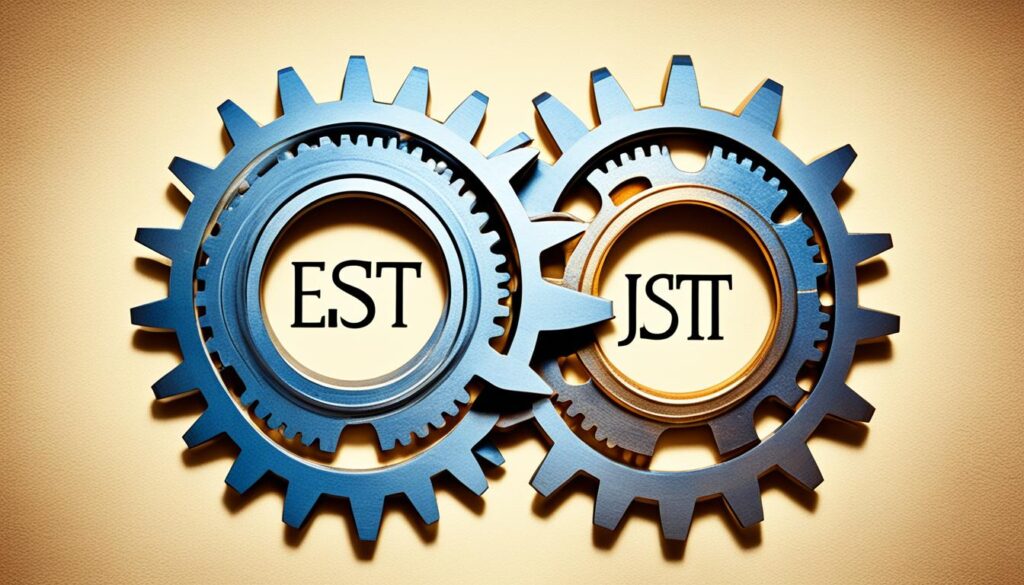
Understanding your personality type and exploring compatibility can be a helpful starting point in your search for a love match. However, it’s important to approach relationships with an open mind and heart, focusing on shared values, effective communication, and mutual respect. As you embark on your journey to find love, remember that compatibility is a complex interplay of various factors, and finding the right partner involves both self-reflection and active participation in building a healthy and fulfilling relationship.
Conclusion
The Myers-Briggs Personality Test is a powerful tool that facilitates self-discovery and personal growth. By uncovering your unique personality type, this test offers valuable insights into your strengths, weaknesses, and preferences. Armed with this knowledge, you can make more informed decisions about your career, relationships, and personal development.
Exploring your Myers-Briggs personality type allows you to better understand yourself and the world around you. It provides a lens through which you can view your interactions with others and navigate various aspects of your life. Whether you’re seeking a fulfilling career, striving for self-improvement, or seeking compatibility in relationships, the Myers-Briggs Personality Test equips you with a comprehensive understanding of who you are.
By embracing the results of the personality test Myers Briggs, you have the opportunity to unlock your true potential and lead a more authentic life. Remember, the journey of self-discovery is ongoing, and as you evolve, so too may your personality type. Embrace the insights provided by the Myers-Briggs test, but also trust your own introspection and personal reflections to guide you on your path to self-actualization.
FAQ
What is the Myers-Briggs Personality Test?
The Myers-Briggs Personality Test is based on the personality theory created by Isabel Myers and Katharine Briggs. It measures your preferences on four dimensions of personality type, as well as 23 more detailed facets of type. The test consists of 130 questions and takes about 10-15 minutes to complete.
Is the Myers-Briggs Personality Test free?
Yes, the test is free to take. However, there is an option to purchase a more comprehensive full report for a fee.
How accurate is the Myers-Briggs Personality Test?
The accuracy of the test has been extensively researched and validated through statistical methods.
How many personality types are there in the Myers-Briggs Personality Test?
The test categorizes individuals into 16 different personality types.
Can my personality type change over time?
While personality can evolve over time, drastic shifts are uncommon, and changes are usually small and gradual.
Can the Myers-Briggs Personality Test help me with my career?
Yes, the test provides brief information about careers for each personality type. There is also a specific TypeFinder for Career Planning test available for more in-depth insights into career compatibility.
What is the difference between the MBTI assessment and the TypeFinder assessment?
The MBTI assessment is the original assessment based on Myers and Briggs’ theory and measures four preferences of personality type. The TypeFinder assessment, on the other hand, is based on the same theory but measures four dimensions and 23 facets of personality type.
How secure is my personal data when taking the Myers-Briggs Personality Test?
The Myers-Briggs Personality Test and TypeFinder assessments do not sell personal data or email addresses to third parties. They comply with applicable privacy laws and have strict data protection measures in place.
What are some common questions and misconceptions about the Myers-Briggs test?
Some common questions include whether personality types can change over time and the desire for the official MBTI assessment. It is important to note that while personality can evolve, drastic shifts are uncommon. Also, there are differences between the MBTI and TypeFinder assessments.
Can the Myers-Briggs Personality Test help me understand my temperament?
Yes, the TypeFinder Temperament Test, based on Keirsey’s theory, can help individuals explore their fundamental approach to the world and gain insights into values, motivations, and how they appear to others.
Can the Myers-Briggs Personality Test help me find a compatible partner?
While there are no hard and fast rules about which types work together, understanding personality types can help individuals determine the type of mate they are looking for and identify characteristics and traits that align with their own.
How can the Myers-Briggs Personality Test help with self-discovery and personal growth?
The test provides valuable insights into an individual’s unique personality type, helping them understand their strengths, weaknesses, and preferences. By utilizing the test results, individuals can make informed decisions about their careers, relationships, and personal development.
Emmeline is the backbone of our content creation team, bringing complex psychological concepts to life with clarity and empathy. As our Expert Writer, she crafts engaging, insightful articles that guide readers through the intricacies of personality assessments and what they reveal about the human condition. Her passion for psychology and personal development shines through in every piece she writes.
Jung Myers-Briggs
ISTP Woman’s Tactical Grace: Insightful Guide

Have you ever been in awe of someone’s knack for effortlessly navigating through complicated scenarios, combining keen analytical abilities with a subtle flair? If your answer is yes, then it’s likely you’ve witnessed the unique poise of an ISTP woman. Being an ISTP myself, I’ve personally encountered the distinct strengths and attributes that characterize this personality type. We’re about to set off on an expedition to uncover the tactical grace embodied by the ISTP woman, exploring their personality traits, tactical abilities, and their extraordinary contributions to different facets of life.
Key Takeaways:
- The ISTP woman possesses a blend of sharp problem-solving skills and understated elegance.
- ISTP women excel in careers that require tactical skills and adaptability.
- They approach relationships in a logical and pragmatic manner.
- Embracing their unique qualities allows ISTP women to unleash their full potential.
- The ISTP woman has immense potential to make a lasting impact in her chosen path.
Understanding the ISTP Personality Type
The ISTP personality type is characterized by several key traits that define their unique approach to life. ISTP women possess a combination of characteristics that shape their individuality and set them apart in various aspects of their lives. Let’s explore the distinct personality traits, strengths, and weaknesses of ISTP women.
ISTP Woman Characteristics
ISTP women are known for their practicality, independent nature, and sharp problem-solving skills. They have a hands-on approach to life and excel in tasks that require a tactical mindset. ISTP women value their autonomy and have a strong sense of personal integrity, always staying true to their principles. With their logical thinking and analytical abilities, they can quickly analyze and solve complex problems.
Personality Type ISTP
With introverted sensing (Si), extroverted thinking (Te), introverted feeling (Fi), and extroverted intuition (Ne), ISTP women have a well-rounded personality type. They are practical and observant, using their senses to gather information about the world around them. Their thinking function allows them to analyze situations objectively, while their feeling function helps them make decisions based on their personal values. ISTP women also possess intuition, which enables them to explore possibilities beyond the surface.
ISTP Female Characteristics
The ISTP woman possesses a unique blend of qualities that make her stand out. She is known for her calm and collected demeanor, often seen as reserved or aloof. ISTP women are independent and value their personal space, displaying a level of self-sufficiency that sets them apart. While they may come across as serious or detached, they appreciate genuine connections and meaningful conversations with others.
ISTP Woman Traits
The ISTP woman’s traits revolve around her logical thinking, problem-solving skills, and adaptability. She is highly capable of handling complex situations efficiently, dissecting problems to find practical solutions. Her ability to think on her feet and troubleshoot makes her an asset in any environment. ISTP women are quick learners and thrive in dynamic settings that challenge their abilities.
ISTP Woman Strengths
- Superb problem-solving skills
- Hands-on approach to tasks
- Highly practical and logical
- Adaptable to various situations
- Independent and self-sufficient
ISTP Woman Weaknesses
- Difficulty expressing emotions
- Reserved or aloof demeanor
- Potential for risk-taking behavior
- Tendency to disregard rules or authority
Understanding the ISTP personality type and the specific characteristics of ISTP women provides valuable insight into their approach to life, their strengths, and their areas for growth. In the next section, we will delve into the tactical skills that ISTP women possess and how these skills contribute to their success in various career paths.
The Tactical Skills of an ISTP Woman
ISTP women possess exceptional tactical skills, making them well-suited for careers that require quick thinking and decisive action. Their ability to analyze complex situations and find effective solutions sets them apart. ISTP women excel in fields such as engineering, technology, law enforcement, and the military. They are highly adaptable and thrive in dynamic environments.
With their innate problem-solving abilities, ISTP women demonstrate a unique blend of efficiency and precision. They approach challenges with a strategic mindset, utilizing their keen observation skills and logical thinking to assess and resolve situations effectively. This combination of tactical awareness and intellectual prowess enables them to navigate high-pressure environments with ease.
In the corporate world, ISTP women can be found excelling in management positions that require quick decision-making and the ability to chart a course of action. Their analytical thinking and solution-oriented mindset make them valuable assets in driving organizational success.
When faced with obstacles, ISTP women exhibit remarkable adaptability and resourcefulness. They readily embrace change and thrive on the thrill of new and unpredictable situations. Their approach to problem-solving is systematic and pragmatic, allowing them to respond swiftly and effectively to challenges that arise.
In addition to their tactical skills, ISTP women possess a wide range of qualities that make them invaluable assets to any team. Their independence and confidence enable them to take charge of projects and drive them to successful completion. They are known for their reliability and dedication to achieving results.
It is worth noting that while many ISTP women are drawn to careers that require tactical skills, they also find fulfillment in creative pursuits. Their practicality and ability to think outside the box allow them to excel in fields such as design, architecture, and entrepreneurship.

ISTP Woman in Relationships
When it comes to relationships, ISTP women bring their unique blend of logic and pragmatism. They value their independence and may find it challenging to express their emotions openly. However, once an ISTP woman commits to a relationship, she becomes a loyal and dedicated partner.
ISTP women appreciate partners who respect their need for personal space and are willing to engage in meaningful discussions. They thrive on communication and understanding, which are key in building a strong and lasting bond.
While ISTP women may not be the most expressive when it comes to emotions, their actions speak volumes. They show their love through practical gestures and acts of service. As partners, they are reliable and dependable, always ready to provide support and assistance.
It’s important to remember that relationships with ISTP women require patience and understanding. They may struggle with opening up emotionally, but with time and trust, they can deepen their connection on a profound level.
The Independent Spirit
ISTP women value their independence and individuality. They thrive when they have the freedom to pursue their own interests and personal growth. Partners who can appreciate and support their need for autonomy will earn their respect and admiration.
Meaningful Discussions
ISTP women enjoy engaging in intellectual discussions. They appreciate partners who stimulate their minds and can hold their own in conversations. Meaningful discussions allow ISTP women to connect with their partners on a deeper level and gain new perspectives.
“Understanding an ISTP woman’s need for personal space and meaningful conversations is essential in building a strong and fulfilling relationship.”
The Importance of Communication
Open and honest communication is vital when in a relationship with an ISTP woman. They appreciate partners who can express their thoughts and feelings openly and give them the space to do the same. Resolving conflicts through calm and rational discussions allows for a more harmonious relationship.
ISTP women may struggle with emotional conversations, but patience and understanding from their partners can help create a safe space for vulnerability and growth. The key is to create an environment where both partners feel comfortable expressing themselves without judgment.
Building Trust
Trust is the foundation of any successful relationship, and it is no different with an ISTP woman. They value honesty, integrity, and dependability in their partners. Being reliable and keeping your promises are crucial for establishing trust with an ISTP woman.
As an ISTP woman opens up and shares more of herself, it is essential to handle her vulnerabilities with care. Creating a safe and non-judgmental space will foster trust and allow the relationship to flourish.
| ISTP Woman in Relationships: Characteristics | ISTP Woman in Relationships: Approach |
|---|---|
| 1. Independent and self-reliant | 1. Logical and pragmatic mindset |
| 2. Loyal and dedicated partner | 2. Struggles with expressing emotions openly |
| 3. Appreciates personal space | 3. Values meaningful discussions |
| 4. Shows love through practical gestures | 4. Requires patience and understanding |
| 5. Thrives on open and honest communication | 5. Builds trust through reliability and integrity |
ISTP Woman in the Workplace
When it comes to the workplace, ISTP women bring valuable skills and qualities that make them stand out. They possess a unique ability to efficiently solve problems and take decisive action, making them highly sought after by employers. ISTP women thrive in hands-on roles that allow them to apply their technical skills and make a tangible impact.
One of the key characteristics of ISTP women is their independence. They value autonomy and prefer a work environment that grants them the freedom to make decisions and take ownership of their projects. This self-reliance allows them to excel in roles where they can work autonomously and take charge of challenging tasks.
ISTP women possess a natural talent for analyzing complex situations and finding effective solutions. Their sharp problem-solving skills and practical mindset enable them to navigate difficult challenges with ease. This ability to think on their feet and make sound judgments makes them a valuable asset in any team or organization.
Here are some of the careers in which ISTP women thrive:
| Career | Description |
|---|---|
| Engineering | ISTP women excel in engineering roles, where they can apply their analytical skills and attention to detail to design and create innovative solutions. |
| Information Technology (IT) | ISTP women’s technical skills and ability to troubleshoot complex problems make them well-suited for careers in IT, whether it’s software development, network administration, or cybersecurity. |
| Entrepreneurship | ISTP women have a knack for identifying opportunities and taking risks. This, combined with their practical mindset, makes them natural entrepreneurs who can launch and manage successful businesses. |
| Project Management | ISTP women’s organizational skills, ability to adapt to changing circumstances, and proficiency in problem-solving make them effective project managers who can lead teams and deliver results. |
ISTP women are known for their hands-on approach and desire for tangible results. They thrive in careers where they can see the direct impact of their work and make a difference in real-world situations.
It’s important for employers to create an environment that values the strengths of ISTP women. Providing them with autonomy, challenging projects, and opportunities to apply their technical skills will allow them to thrive and contribute their best work. Recognizing and appreciating their problem-solving abilities will foster a positive and productive work environment.

ISTP Woman’s Strengths and Weaknesses
ISTP women possess a unique set of strengths and weaknesses that shape their career paths and personal relationships. Understanding these attributes is crucial in unleashing their full potential. Let us delve into the strengths and weaknesses of istp women.
Strengths
1. Practicality: ISTP women have a strong practical mindset, enabling them to find practical solutions to complex problems.
2. Analytical Thinking: They excel at analyzing various situations, allowing them to approach challenges with a logical and objective perspective.
3. Adaptability: ISTP women are highly adaptable, making them well-suited for dynamic and ever-changing environments. They thrive under pressure and are quick to adjust to new circumstances.
4. Troubleshooting Skills: Their ability to troubleshoot and resolve issues efficiently sets them apart. ISTP women can calmly navigate through challenges, ensuring smooth operations.
5. Resourcefulness: They are skilled at addressing problems using the resources at hand, making the most out of limited means.
Weaknesses
1. Difficulty Expressing Emotions: ISTP women may find it challenging to express their emotions openly. This can lead to them being perceived as distant or insensitive by others.
2. Reserved Nature: They tend to be private individuals who prefer keeping their thoughts and feelings to themselves. This reserved nature can sometimes create barriers in building close connections with others.
3. Risk-Taking Tendency: ISTP women are prone to taking risks and being rebellious if they feel that rules or authority hinder their autonomy. While this can lead to innovation and creativity, it can also result in disregard for established norms.
A comprehensive understanding of these strengths and weaknesses enables ISTP women to make informed decisions in their careers and personal lives. With conscious effort and self-awareness, they can leverage their strengths while working on areas of improvement to lead fulfilling and successful lives.
Career Choices for ISTP Women
ISTP women have a wide range of career options available to them, thanks to their unique strengths and interests. Their problem-solving skills and analytical thinking make them particularly suitable for technical roles, where they can put their talents to good use. Some promising career paths for ISTP women include:
- Engineering: ISTP women excel in various engineering disciplines, such as civil engineering, mechanical engineering, and electrical engineering. Their analytical mindset and attention to detail make them valuable contributors to the field.
- Computer Programming: With their logical thinking and ability to grasp complex systems, ISTP women thrive in the world of programming. They can navigate through code with ease and find innovative solutions to coding challenges.
- Skilled Trades: ISTP women can take on skilled trades such as carpentry, plumbing, and welding. Their hands-on approach and practical problem-solving skills allow them to excel in these trades, where precision and attention to detail are crucial.
- Entrepreneurship: ISTP women have a natural ability to take charge and make independent decisions. As entrepreneurs, they can build their own businesses and utilize their tactical skills to drive success.
These are just a few examples of the many career paths that ISTP women can pursue. Whether it’s in traditional fields or emerging industries, ISTP women bring their unique strengths and problem-solving abilities to the table, making a significant impact in their chosen professions.
Remember, when it comes to career choices, it’s essential for ISTP women to follow their passions and align their careers with their core values and interests. By doing so, they can find fulfillment and success in their professional journeys.
Building Successful Relationships with an ISTP Woman
When it comes to building a relationship with an ISTP woman, understanding and respecting her unique traits is key. ISTP women value their independence and personal space, so it’s important to give them the freedom they need to be their authentic selves. These women appreciate partners who can engage in intellectual discussions and support their pursuits and interests.
ISTP women may struggle with expressing their emotions openly, but that doesn’t mean they don’t have deep feelings. They appreciate partners who can provide emotional support and understanding, even if they don’t always express it verbally. By being patient and allowing them the space to process their emotions, you can create a foundation of trust and intimacy in the relationship.
Open communication is vital in a relationship with an ISTP woman. They value honest and direct conversations that allow for problem-solving and growth. By being transparent and sharing your thoughts and feelings, you can foster a deeper connection with your partner. Their logical and pragmatic nature means they appreciate productive discussions that lead to practical solutions.
ISTP women are compatible with various types of partners, including other ISTP women or men. They appreciate partners who share their independent nature and understand their need for personal space. Finding common interests and activities to enjoy together can help strengthen the bond between you.
Remember, compromise is crucial in any successful relationship. Both partners should be willing to meet each other halfway and find a balance between personal freedom and shared experiences. By understanding and appreciating the unique qualities of an ISTP woman, you can create a loving and fulfilling partnership.
| Pros of Building a Relationship with an ISTP Woman | Cons of Building a Relationship with an ISTP Woman |
|---|---|
| An independent partner who values personal space | Struggles with expressing emotions openly |
| Highly intellectual and engaging in discussions | May appear aloof or reserved |
| Appreciates partners who provide emotional support | Can be direct and blunt with communication |
| Compatible with various personality types | Requires compromise for a balanced relationship |
The ISTP Woman’s Impact in Various Careers
The tactical grace and problem-solving skills of ISTP women make them invaluable assets in a wide range of careers. With their natural aptitude for hands-on problem-solving, critical thinking, and adaptability, ISTP women excel in fields that require practicality and quick decision-making. Their unique blend of qualities allows them to make a significant impact in their chosen fields, from engineering to law enforcement and beyond.
ISTP Woman’s Career Choices
ISTP women have a multitude of career choices available to them, thanks to their distinctive strengths and abilities. With their strong problem-solving skills, they thrive in technical roles that require analytical thinking, such as engineering, computer programming, and skilled trades. Their ability to handle high-pressure situations also makes them well-suited for careers in law enforcement, where their tactical expertise shines through.
“ISTP women have an incredible knack for handling complex challenges with ease, using their practical skills and sharp intuition to find effective solutions.” – Career Advisor
Additionally, the independent nature of ISTP women makes them successful entrepreneurs, as they enjoy taking charge of their own projects and businesses. Their ability to make decisions independently and adapt quickly to changing circumstances gives them a competitive edge in the business world.
The ISTP Woman as a Partner
ISTP women approach relationships with a logical and pragmatic mindset, valuing independence and personal growth. As partners, they thrive alongside individuals who respect their need for personal space and allow them to pursue their own interests. While ISTP women may struggle with expressing their emotions openly, they are devoted and loyal to their partners once committed. Open communication, mutual understanding, and intellectual engagement are key to building strong and fulfilling relationships with an ISTP woman.
The ISTP Woman’s Impact in Various Careers (continued)
Throughout their careers, ISTP women leave a lasting impact with their problem-solving abilities and resourcefulness. They are quick to analyze complex situations and find innovative solutions, often being sought after for their critical thinking capabilities. Whether it’s developing groundbreaking technologies as engineers or keeping communities safe as law enforcement professionals, ISTP women make significant contributions to their respective fields.
By leveraging their tactical grace and blending it with their problem-solving skills, ISTP women navigate various industries, adapting to challenges with resilience and ingenuity. Their ability to think on their feet, coupled with their hands-on approach, sets them apart and makes them invaluable assets in the workplace.
Unleashing the Power of the ISTP Woman
By embracing and harnessing their innate qualities, ISTP women can unleash their full potential. They possess a unique combination of tactical skills and problem-solving abilities that can propel them to excel in their careers and build fulfilling relationships.
ISTP women have a natural inclination towards practicality and critical thinking, allowing them to navigate complex situations with ease. Their analytical mindset and hands-on approach make them valuable assets in various industries, such as engineering, technology, and law enforcement. By leveraging their tactical skills, ISTP women can not only thrive in these careers but also make a significant impact.
When it comes to relationships, ISTP women may have their own unique ways of expressing emotions, but their loyalty and dedication are unmatched. Whether as a wife or a girlfriend, an ISTP woman brings strength and independence to the partnership. They appreciate partners who respect their need for personal space and share their intellectual curiosity. Open communication and mutual understanding lay the foundation for a loving and lasting relationship with an ISTP woman, be it with another ISTP woman or a man.
To fully unlock their potential, ISTP women can further develop their emotional intelligence. By honing their self-awareness and cultivating empathy, they can enhance their ability to connect with others on a deeper level. This emotional growth, coupled with their tactical skills, allows ISTP women to navigate various aspects of their lives with grace and achieve personal and professional success.
ISTP Woman Unleashed: Key Points
- Embracing innate qualities
- Tactical skills and problem-solving abilities
- Success in careers and relationships
- Strength and independence in partnerships
- Emotional intelligence as a catalyst for growth
“The power of the ISTP woman lies in her ability to blend sharp problem-solving skills with understated elegance.”
To summarize, ISTP women possess remarkable potential that can be unlocked by embracing their innate qualities. Their tactical skills and problem-solving abilities allow them to excel in various careers, while their unique approach to relationships brings strength and dedication. By nurturing emotional intelligence along with their practical mindset, ISTP women can navigate life’s challenges with grace and accomplish both personal and professional fulfillment.
Conclusion
In conclusion, the ISTP woman possesses a unique set of personality traits that make her truly remarkable. With her tactical grace, she combines sharp problem-solving skills with understated elegance. The ISTP woman’s practicality, adaptability, and analytical thinking set her apart in various aspects of life, including relationships and careers.
While the ISTP woman has her strengths and weaknesses, understanding and embracing her personality traits can lead to personal growth and success. Her practicality allows her to excel in hands-on tasks, while her adaptability enables her to thrive in dynamic environments. With her analytical thinking, she can analyze complex situations and find effective solutions. These qualities make the ISTP woman a force to be reckoned with.
When it comes to compatibility, the ISTP woman seeks partners who respect her need for independence and personal space. Open communication and understanding are essential in building a strong bond with her. In the workplace, the ISTP woman’s tactical skills make her well-suited for roles that require quick thinking and decisive action. She is highly adaptable and excels in careers such as engineering, technology, law enforcement, and the military.
Ultimately, the ISTP woman has immense potential to leave a lasting impact in her chosen path and create a remarkable legacy. By embracing her personality traits and leveraging her strengths, the ISTP woman can navigate various aspects of life with grace and achieve personal and professional success. Her tactical grace truly sets her apart.
FAQ
What are the characteristics of an ISTP woman?
ISTP women are known for their independent nature, practicality, and strong problem-solving skills. They possess a unique blend of sharp analytical thinking and understated elegance.
What are the strengths and weaknesses of an ISTP woman?
ISTP women have strengths such as practicality, adaptability, and analytical thinking. However, they may struggle with expressing emotions and can be perceived as reserved or aloof.
What are some career options for ISTP women?
ISTP women excel in careers that require hands-on problem-solving and technical skills, such as engineering, IT, entrepreneurship, and project management.
How do ISTP women approach relationships?
ISTP women value independence and may struggle with expressing emotions openly. However, they are loyal and dedicated partners who appreciate meaningful discussions and understanding.
What is the impact of an ISTP woman in the workplace?
ISTP women are valued for their ability to solve problems efficiently and take action. They excel in hands-on roles that allow them to apply their technical skills and thrive in dynamic environments.
How can I build a successful relationship with an ISTP woman?
It’s important to respect her need for independence and personal space. Engage in intellectual discussions and provide emotional support. Open communication and compromise are key to a successful relationship with an ISTP woman.
How can an ISTP woman unleash her full potential?
By embracing and harnessing their innate qualities, ISTP women can excel in their careers and build fulfilling relationships. Developing emotional intelligence and self-awareness can lead to personal growth and success.
Felicity, our Author, pens in-depth articles and guides that delve into the heart of personal discovery. Her narrative-driven approach weaves together theory, practice, and personal anecdotes, making the journey of self-exploration both relatable and inspiring. Felicity’s contributions help illuminate the path for those seeking a deeper understanding of themselves and their relationships.
-

 Self-Understanding3 months ago
Self-Understanding3 months agoUnderstanding DMCA Protections & Compliance
-

 Relationship Dynamics3 months ago
Relationship Dynamics3 months agoCan a Man Truly Love His Side Chick
-

 Enneagram of Personality1 week ago
Enneagram of Personality1 week agoEnneagram Test: Printable Version for Easy Self-Discovery
-

 Personality Exploration3 weeks ago
Personality Exploration3 weeks agoDiscover Your Traits with Atomic Habits Personality Test
-

 Personality Exploration3 months ago
Personality Exploration3 months agoDOPE Personality Test Explained: Traits & Types
-
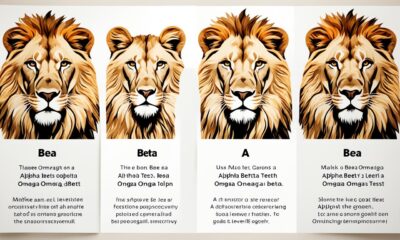
 Personality Exploration3 weeks ago
Personality Exploration3 weeks agoAlpha Beta Omega Personality Test Explained
-

 Personality Exploration3 months ago
Personality Exploration3 months agoAlpha Beta Omega Sigma Female Personality Quiz
-

 Self-Understanding2 months ago
Self-Understanding2 months agoDiscover Your Traits with Our Personality Test
